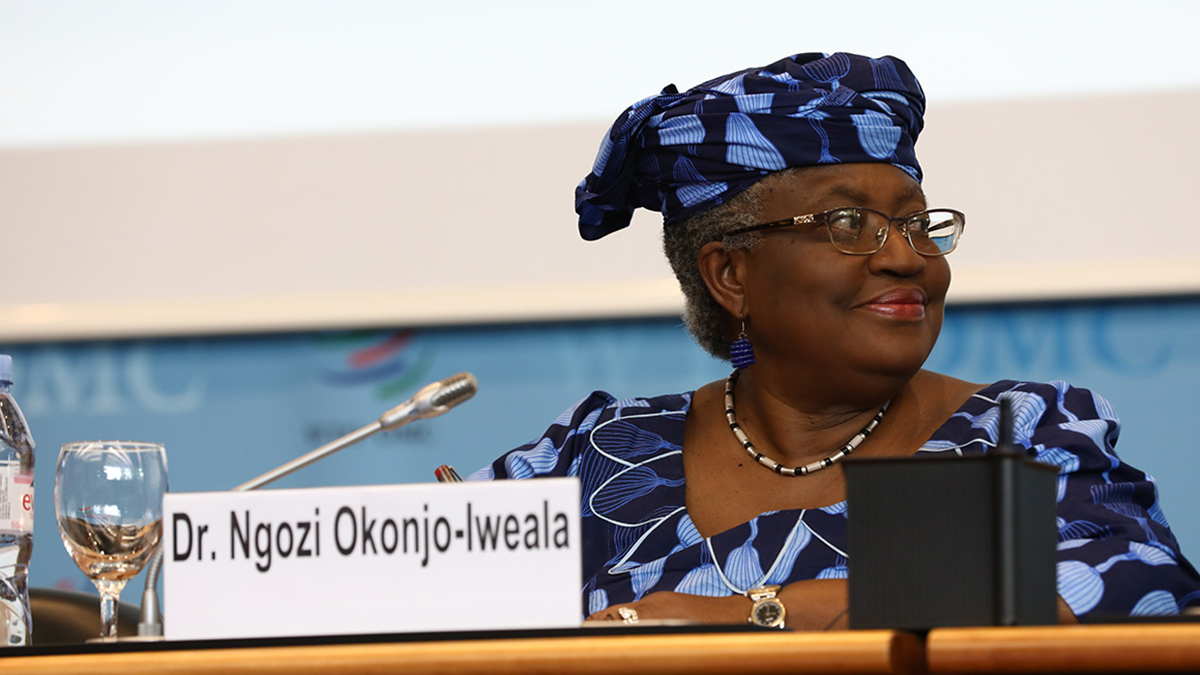A Woman in Charge: Challenges and Opportunities for the New WTO Director-General
March 19, 2021

In celebration of Women’s History Month, the AUWCL Trade, Investment and Development Program and the Shridath Ramphal Centre discussed the challenges and opportunities ahead for the newest World Trade Organization Director General, Ngozi Okonjo-Iweala, the first woman and first African tapped to lead the WTO. The panel discussion was moderated by R Renata Amaral, Adjunct Professor at AUWCL and Jan Yves Remy, Deputy Director, Shridath Ramphal Centre. The speakers were Padideh Ala’i, Professor at WCL and Director of International and Comparative Legal studies program and ILSP; Anabel González, Nonresident Senior Fellow at the Peterson Institute for International Economics; Jennifer Hillman, Senior Fellow at the Council on Foreign Relations; and Lisa Schroeter, Global Director, Trade and Investment Policy at Dow and current President of WIIT Trust.
Dr. Ngozi has 25 years of experience as a development economist and previously was the minister of finance for Nigeria where she made significant contributions to Nigeria’s debt negotiations. Since the beginning of her term at WTO Director-General, Dr. Ngozi has made it clear that she believes trade is about people and her perspective as a woman of color leading the WTO will bring a unified and inclusive approach to trade challenges. Her understanding of the ensuring equity will benefit not only women and minorities, but the entire global trade system.
Dr. Ngozi faces criticisms not usually seen by her male predecessors. Previous Directors General have not had their personal lives on display, including reputation, age, outfit choice, or family life that Dr. Ngozi must respond to. Dr. Ngozi also faces enormous pressure to deliver miracle solutions to reinvigorate the multilateral trading system. The WTO is in a current state of crisis, and the hope is under her leadership the WTO can regain a sense of balance. Her impressive background suggests that she understands how important it is to restore balance for both equity’s sake and for better policy outcomes in the areas of education and trade, both of which are empowering over the long term for women.
Trade plays an especially important role in improving the living conditions for women in their access to jobs: international trade employs more women than most other industries. In many countries, women make up 50% or more of the workforce through trade, which in turn creates better jobs for women by reducing informal employment. The situation in Morocco and Vietnam illustrate this point particularly well. Women are also highly influential in consumption patterns relevant for international trade, and countries that are more open to trade tend to have better gender equality, access to education, and better working conditions for women.
When discussing how to campaign and help address issues for all women, it is important to acknowledge how women have been excluded from male-dominated distribution networks, have limited access to finance, and still face restrictions on ownership of land in several parts of the world. Looking at developing countries, the products and industries with the highest tariffs tend to be on items that women purchase.
In debating the current challenges and priorities that the WTO needs to address, the panel made considerations about Dr. Ngozi’s former role as Chair of the Global Alliance for Vaccines and Immunization (GAVI) and how the pandemic may be addressed in WTO decision making. Dr. Ngozi understands that the WTO can play a crucial role in ending the pandemic as a liaison in ensuring equitable vaccine distribution.